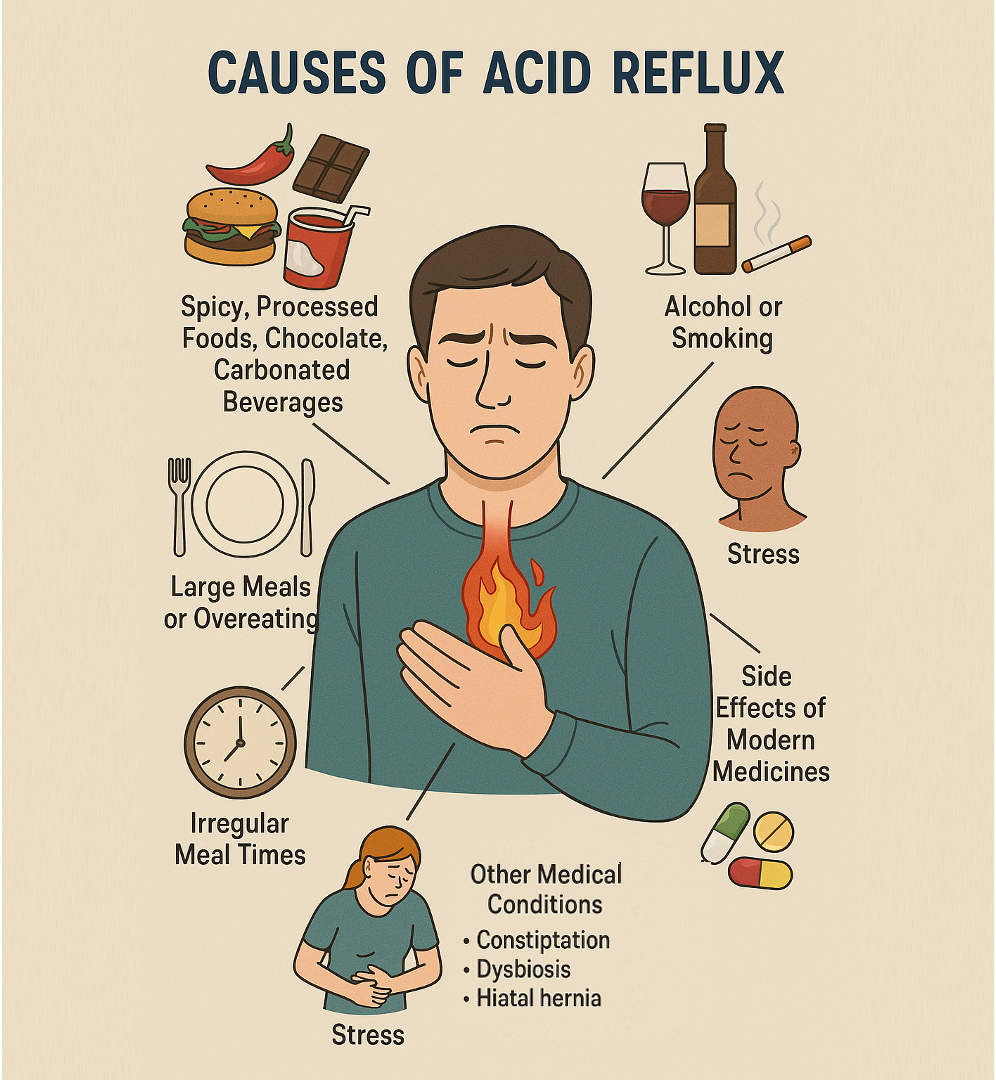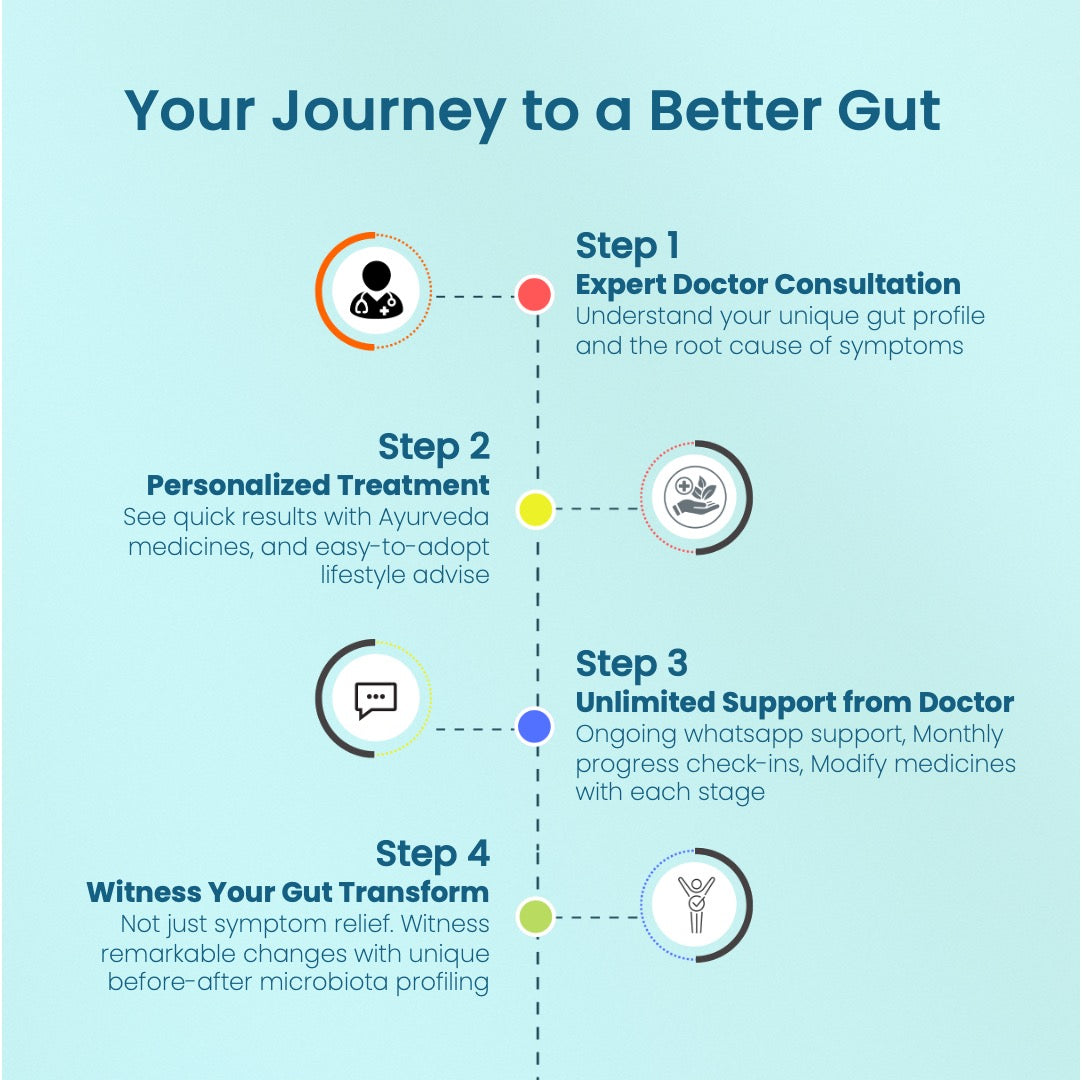Home / pages / Acid Reflux
Acid Reflux
Acid Reflux: Understanding the Burn and Finding Lasting Relief
Acid reflux, also known as gastroesophageal reflux (GER), occurs when stomach acid frequently flows back into the esophagus (food pipe), causing discomfort, heartburn, or a sour taste. While occasional heartburn is common, persistent acid reflux can disrupt digestion and even damage your gut lining if untreated. Gastroesophageal reflux disease (GERD) is the chronic and often more severe form, occurring more than twice a week or causing significant symptoms and complications. Understanding the intricacies of acid reflux, its various forms, and underlying causes is the first step toward sustainable relief from this digestive disorder.At gCODE, our integrative clinic blends modern microbial science and evidence-based gut care with the ancient wisdom of Ayurveda to address the root causes of digestive issues, including acid reflux. This page explores the spectrum of acidity (from occasional discomfort to GERD), the multifaceted factors contributing to its development, risk factors, diagnosis and treatment in both modern and Ayurvedic medicine, and how gCODE's personalized solutions can guide you towards lasting comfort and improved gut health.
What is Acid Reflux? Understanding Different Forms of Acidity and Heartburn
At its core, acid reflux happens when stomach acid, crucial for breaking down food, flows backward into the esophagus. This backflow irritates the delicate esophageal lining, leading to the burning sensation known as heartburn. The frequency and intensity of this reflux vary significantly, highlighting the spectrum of acidity.
It's crucial to recognize the different ways acidity can manifest, beyond simple heartburn:
• Occasional Acidity/Heartburn: Many experience mild, infrequent episodes, often linked to specific dietary choices or habits that temporarily imbalance Agni (digestive fire) and Pitta (bio-energy associated with heat and transformation). This intermittent digestive discomfort might not indicate a chronic issue.
• Acid Reflux (General): This encompasses the broader experience of stomach acid backing up, causing various symptoms beyond just heartburn, including regurgitation and chest pain. Understanding this broader definition is key to recognizing the problem.
• GERD (Gastroesophageal Reflux Disease): This is a chronic digestive disease characterized by frequent acid reflux that can lead to complications. As functional medicine expert Dr. Mark Hyman often emphasizes, persistent symptoms signal deeper imbalances requiring comprehensive attention for this gastrointestinal disorder.
• Laryngopharyngeal Reflux (LPR) or Silent Reflux: Acid reaches the voice box and throat, often without typical heartburn, presenting as cough, hoarseness, or a throat lump sensation. This "silent" form can be easily overlooked as a reflux symptom.
What Causes Acid Reflux?

The primary mechanism behind acid reflux involves the lower esophageal sphincter (LES), the muscular ring acting as a "doorman" between the esophagus and stomach. Normally, the LES relaxes to allow food passage and then tightens to prevent backflow. In acid reflux, the LES weakens or relaxes inappropriately, leading to gastric acid entering the esophagus. Several factors contribute to this LES dysfunction, often acting in combination to trigger acid reflux symptoms:
1. Dietary Factors
2. Lifestyle Factors
3. Other Conditions like constipation, dysbiosis, or hiatal hernia
4. Side Effects of modern medicines
Dietary Factors
1. Dietary Triggers:
As highlighted by various studies, consuming spicy, acidic, fatty, salty, or unhealthy processed foods, chocolate, caffeine, alcohol, and carbonated beverages can relax the LES and delay stomach emptying.
2. Overeating or Regular Large Meals
This distends the upper stomach, increasing pressure on the LES. Managing meal portions is crucial for digestive health. Ayurveda suggests Matra Ahara (appropriate quantity of food).
Lifestyle Factors
1. Irregular Meal Timings.
2. Smoking and Alcohol:
Both irritate the esophagus and weaken the LES.
3. Stress:
High stress levels disrupt digestion and increase acid production, underscoring the gut-brain connection.
Other Conditions
1. Delayed Gastic Emptying:
Prolonged food retention in the stomach or symptoms like constipation increases reflux risk.
2. Dysbiosis:
An imbalance in gut bacteria and insufficient digestive enzymes can hinder efficient food processing, leading to increased pressure and reflux.
3. Hiatal Hernia:
A condition where part of the stomach protrudes through the diaphragm, weakening the LES.
Medicine Side Effect
Modern medicines like NSAIDs, calcium channel blockers, and antidepressants can relax the LES and engender other diseases.
Risk Factors and Complications Associated with Acid Reflux
Several factors increase the likelihood of developing acid reflux and GERD.
1. Age-related weakening of the LES.
2. Eating a low-fiber, high-sugar, or high-processed food diet.
3. Obesity or high BMI increases abdominal pressure, putting strain on LES.
4. Certain medical condition can predispose individuals to acid reflux, especially, pregnancy induced hormonal changes and uterine pressure.
5. Sedentary lifestyle, especially when combined with tobacco products or Acohol.
Untreated chronic acid reflux (GERD) can lead to serious complications affecting esophageal health, including esophagitis (inflammation of the esophagus), esophageal strictures (narrowing of the esophagus), Barrett's esophagus (a precancerous condition), esophageal cancer, respiratory problems (aspiration), and dental erosion due to stomach acid reaching the mouth.
Diagnosis and Treatment of Acid Reflux or GERD
Best Practices to Manage Symptoms
1. Identify and avoid trigger foods (fatty, spicy, acidic, caffeinated, carbonated)
2, Eat smaller, more frequent meals
3. Don’t lie down immediately after eating
4. Sleep with your head elevated to prevent nocturnal acid reflux
5. Manage your body weight
6. Avoid or severally reduce smoking and/or alcohol
When to Seek Medical Attention?
It's crucial to seek medical attention for acid reflux if symptoms are frequent (more than twice a week), severe, persist despite lifestyle changes and over-the-counter remedies, or are accompanied by alarming signs such as difficulty swallowing, vomiting, or unexplained weight loss.
How is Acid Reflux or GERD Diagnosed?
Conventional diagnosis often involves upper endoscopy, pH monitoring, esophageal manometry, and occasionally an upper GI series (barium swallow) to examine the structure and function of the upper digestive tract. These methods help determine the severity of reflux, identify any esophageal damage, and rule out other underlying conditions.
Conventional Treatment and Limitations
While modern medications like antacids, H2 blockers, and PPIs can provide symptom relief, their approach is often limited to reducing the amount of acid in the stomach rather than addressing the underlying causes of LES dysfunction or the broader digestive imbalance. Long-term use of these medications can lead to dependency and may be associated with various side effects, including constipation or diarrhea, gas, nausea, nutrient malabsorption, bone density issues, and hypercalcemia (too much calcium in your blood).5 As functional medicine experts often point out, merely suppressing symptoms without addressing the root cause can lead to a cycle of dependence and neglect the interconnectedness of the digestive system with overall health.
At gCODE, no two treatment plans for acid reflux are the same. We combine advanced diagnostics with your gut type and natural remedies for lasting relief, integrating both modern science and Ayurvedic principles. Our approach begins with your gut profiling and a comprehensive in-depth symptom assessment, considering your medical history, medications, stress levels, and any prior treatments. Your doctor may advise gut microbiome testing to identify dysbiosis and food sensitivity to pinpoint specific triggers. Then, they develop a personalized treatment plan that considers your unique Prakriti, diet, lifestyle, and the crucial gut-brain connection, often incorporating Ayurvedic herbs known to pacify Pitta and support healthy digestion, such as Amalaki, Yashtimadhu, and Shatavari.

Access the best gut expert doctors from the comfort of your home and recover under their continued guidance.
Reclaim Your Gut Health: Embrace an Acidity-Free Life with Personalized gCODE Solutions
Acidity doesn't have to be a recurring burden. At gCODE, we empower you with the knowledge, expert care, and personalized solutions to reclaim your gut health and live a life free from the discomfort of acid reflux.

